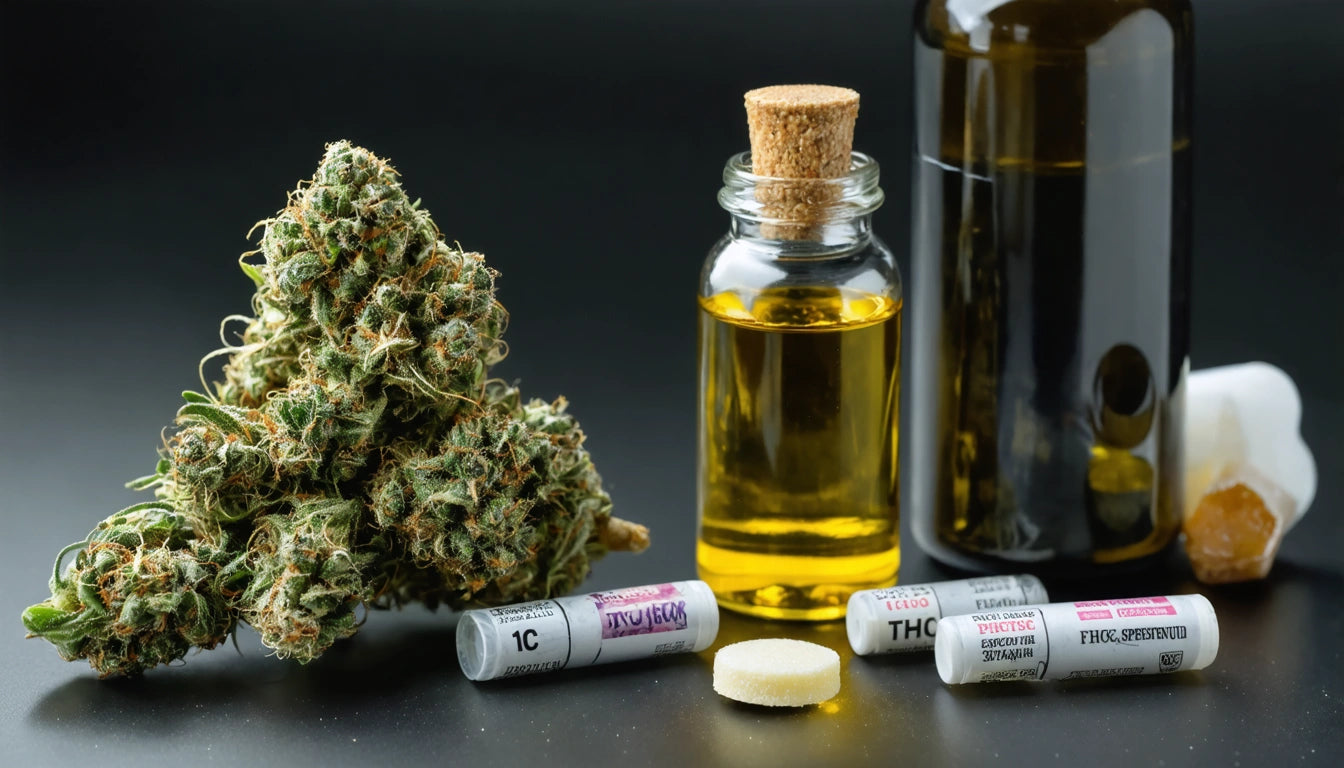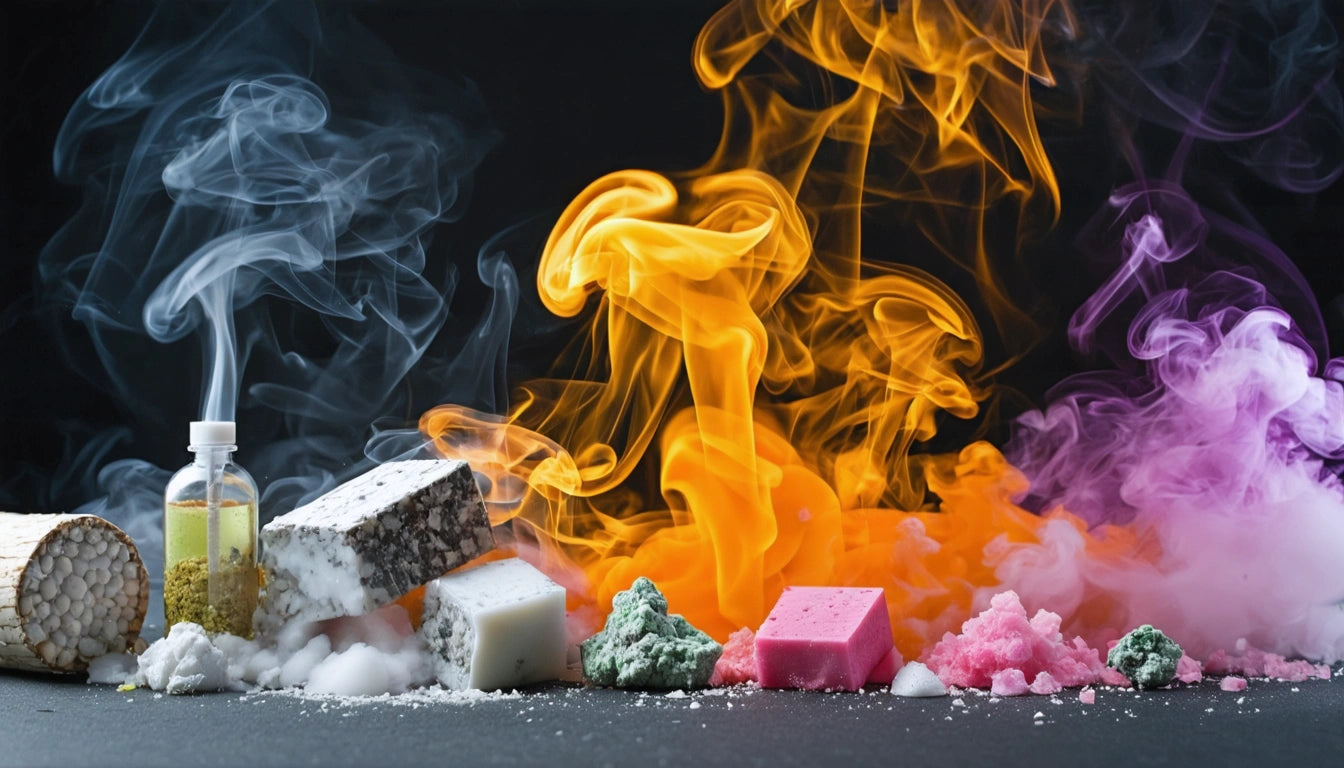Table of Contents
Understanding THC: Types, Uses, and Terminology Explained
Tetrahydrocannabinol, commonly known as THC, stands as the primary psychoactive compound in cannabis. As legalization expands across regions, understanding what THC is, what THC stands for, and its various forms becomes increasingly important for consumers, producers, and healthcare professionals alike.
What is THC: Basic Definition and Origin
THC stands for delta-9-tetrahydrocannabinol, the chemical compound responsible for most of marijuana's psychological effects. It acts by binding to cannabinoid receptors concentrated in the brain and central nervous system to produce the high associated with cannabis consumption.
Where does THC come from? It naturally occurs in cannabis plants, primarily concentrated in the resin produced by glands of the plant called trichomes. These trichomes are most abundant on the flowering buds of female plants, though they can be found in smaller amounts on leaves as well.
The cannabis plant produces THC in its acidic form, THCA, which must be decarboxylated (typically through heating) to convert into active THC. This is why raw cannabis must be heated through smoking, vaping, or cooking to produce psychoactive effects.
THC Types and Variants: From THC-O to THC-V
What is THC-O?
THC-O (or THC-O acetate) is a synthetic cannabinoid derived from hemp. When people ask what is THC-O or what does THC-O mean, they're referring to a modified form of THC that's reportedly more potent than standard delta-9 THC. Its legal status varies by jurisdiction and requires specialized extraction and processing equipment to produce safely and consistently.
What is THCV?
THC-V (tetrahydrocannabivarin) is a naturally occurring cannabinoid that shares a similar molecular structure with THC but produces different effects. While research is still emerging, THCV may suppress appetite rather than stimulate it and may provide different therapeutic benefits than standard THC.
What is THCO?
THCO (often written as THC-O) refers to the same compound mentioned above. This acetate ester of THC has gained popularity in markets where traditional THC faces stricter regulations. Understanding the differences between THC variants helps consumers make informed choices.
Common THC Forms and Concentrates
What is THC Sugar?
THC sugar refers to a cannabis concentrate with a sugar-like consistency. This extract gets its name from its granular texture, resembling wet sugar. It's valued for its high potency and full-spectrum profile that preserves terpenes and cannabinoids from the original plant.
What is Full Spectrum THC?
Full spectrum THC products contain not only THC but also other cannabinoids, terpenes, and compounds naturally present in the cannabis plant. This creates what's known as the "entourage effect," where these compounds work together to potentially enhance therapeutic benefits compared to isolated THC.
What is FECO THC?
FECO stands for Full Extract Cannabis Oil, a highly concentrated whole-plant extract that contains the full range of cannabinoids, terpenes, and other beneficial compounds. FECO THC is typically made using ethanol extraction and is often used for medicinal purposes due to its potency and comprehensive cannabinoid profile.
What is THC Concentrate?
THC concentrates encompass a variety of products with high THC potency, including:
- Shatter: A glass-like concentrate that "shatters" when broken
- Rosin: Solventless extract made using heat and pressure
- Isolate: Pure THC crystals with minimal other compounds
- Liquid THC: Concentrated THC in liquid form, often used in vape cartridges
These concentrates can reach potency levels of 80-90% THC, far exceeding the 15-25% typically found in cannabis flower. Understanding THC effects at these potency levels is crucial for safe consumption.
Understanding THC Terminology and Testing
What Does ND THC Mean?
On lab reports, "ND THC" stands for "Non-Detectable THC," indicating that THC levels were below the testing equipment's threshold for detection. This doesn't necessarily mean zero THC is present, just that it's below the minimum detectable limit.
What Does 4 Panel No THC Mean?
A "4 panel no THC" typically refers to a drug test that screens for four common substances but excludes THC testing. These tests might check for cocaine, opiates, amphetamines, and PCP while intentionally omitting cannabis screening.
What is Synthetic THC vs. Natural THC?
Synthetic THC refers to laboratory-created compounds that mimic the effects of naturally occurring THC. Products like Marinol (dronabinol) are FDA-approved synthetic THC medications, while illicit synthetic cannabinoids (sometimes called "Spice" or "K2") can be dangerous and unpredictable. Natural THC is derived directly from the cannabis plant and has a long history of human use.
Understanding how THC appears on drug tests is important for medical and recreational users alike, especially in regions with workplace testing policies.
THC Innovation and Future Applications
The cannabis industry continues to evolve with new THC variants and delivery methods emerging regularly. THC-P, for example, has been identified as potentially more potent than traditional THC, while research into minor cannabinoids expands our understanding of the plant's complexity.
Innovations in extraction technology allow for more precise isolation of specific compounds, enabling the creation of custom cannabinoid profiles tailored to specific effects or medical applications. From nano-emulsified THC beverages to targeted pharmaceutical applications, the future of THC research and product development promises continued expansion and refinement.
As consumer education improves and THC terminology becomes standardized, the market will likely see more sophisticated products designed for specific experiences and therapeutic outcomes rather than simply maximizing THC content.
Whether you're a curious newcomer or industry professional, understanding the fundamentals of what THC is, what THC stands for, and its various forms provides an essential foundation for navigating the complex and rapidly evolving cannabis landscape.











Leave a comment
All comments are moderated before being published.
This site is protected by hCaptcha and the hCaptcha Privacy Policy and Terms of Service apply.